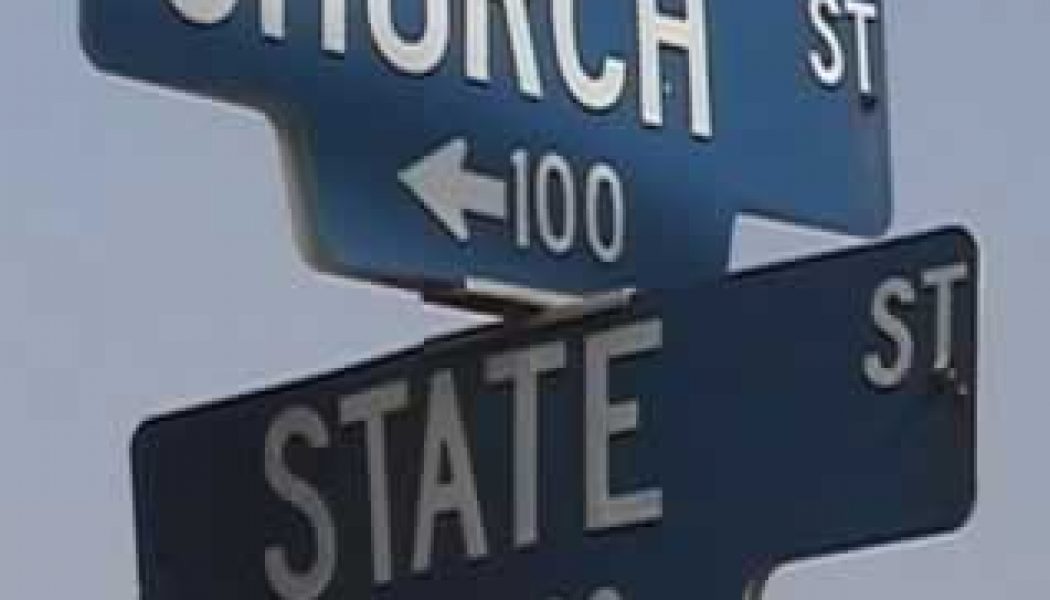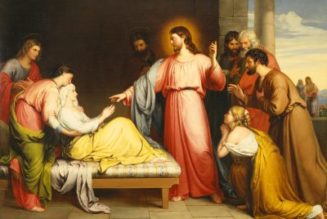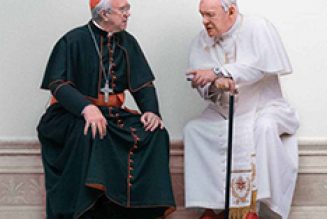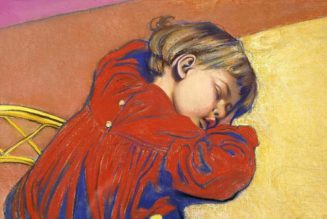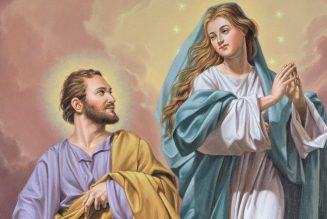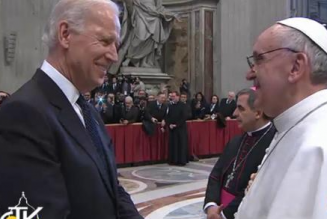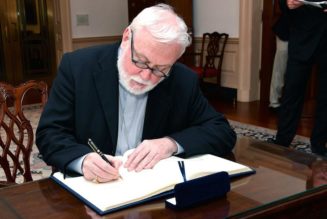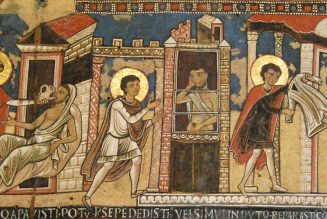
Last week on the blog we discussed the rise of vocal, extreme secularism, as exemplified by New York Governor Andrew Cuomo (here). Extreme secularism is not merely a worldly attitude devoid of God, it is a position that actively denies that faith, prayer, and/or religious expression play a role worthy of recognition. Militant secularists go further, seeking to remove any religious practice or mention of God from the public square.
This past week we saw another example of this extreme secularism in remarks made by Bill de Blasio, Mayor of New York City. Asked why state/city COVID-19 protocols have been almost completely ignored and unenforced during recent protests in NYC (and across the nation), Catholic News Agency reports:
New York City Mayor Bill de Blasio said Tuesday that ongoing protests in the city merit exceptions to coronavirus regulations, while religious services do not. The mayor’s remarks have drawn criticism from New York’s archdiocese.
“When you see a nation, an entire nation, simultaneously grappling with an extraordinary crisis seeded in 400 years of American racism, I’m sorry, that is not the same question as the understandably aggrieved store owner or the devout religious person who wants to go back to services,” de Blasio said at a June 2nd press conference, while defending his policy of allowing mass protests while continuing to restrict religious gatherings during the coronavirus pandemic.
… New York has been under a strict stay-at-home order starting March 22nd, and it is only in the early stages of reopening public spaces. New Yorkers are being instructed to “wear a mask and maintain 6 feet distance in public.”
Back on March 27 the Mayor warned that if the religious services continued, he said, “our enforcement agents” would shut them down, and he threatened fines and even permanent closure of houses of worship for further disobedience of the order. He threatened future religious gatherings with mass arrests.
Meanwhile, protesters have gathered nightly by the thousands across the city to demonstrate against racism and police brutality following the May 25th death of George Floyd in police custody.
… On Thursday, the mayor announced that restaurants in the city will shortly be allowed to serve patrons outdoors.
“New York’s restaurants are part of what make us the greatest city in the world. They’ve taken a hit in our fight against COVID-19—and there’s no recovery without them,” de Blasio stated. Churches are not slated to fully reopen until stage four of the state’s reopening program, along with schools, theaters, and entertainment venues [CNA June 4th 2020].
So, here is the situation: Protesters get waivers, but those who want to attend religious services are told to wait, even if we state that we will follow the state/city guidelines on social distancing, disinfection of surfaces, etc. This raises several questions and brings me to make a few observations.
If protesters are permitted to violate state/city regulations that just a week ago were called essential for public health during an emergency unprecedented in our lifetimes, were those guidelines really that critical after all? How does this engender respect for the seriousness of emergency measures?
This is especially the case for New York City, which has been an epicenter for the virus. They had even stricter guidelines there than we have here in Washington, D.C. One would think that Mayor de Blasio would be particularly adamant about enforcing these critical measures. We were told that hundreds of thousands of additional deaths would occur if we did not observe the state/city regulations. Are we to conclude, from a health perspective, that the restrictions were not really that necessary and that health experts and/or government officials knew this? How else can the abandonment of the regulations be explained?
I believe that the Mayor is correct in stating that the cancer of racism has existed for 400 years (in fact, I think longer). However, this feeds off a deeper wound going back much farther: Original Sin. This grievous wound has left behind in us a tendency toward sin; toward selfishness, hostility, unchastity, and greed. Racism emerges from this cauldron of simmering sin. Religious teaching, the sacraments, and prayer are focused on healing the wound of original sin and its effects. Peaceful protest has its place, but so does prayer. It is shortsighted to think we can heal a visible wound like racism while ignoring its underlying causes. We do not simply have a lapse of justice in racism; we have deep, festering wounds that require prayer and repentance.
I would ask Mayor de Blasio to consider how much more fierce, angry, unjust, and unkind our world has become since we have denigrated prayer, marginalized God, and banished biblical teaching from the public square. No age is perfect, but we are clearly in one of the darkest periods in a long, long time.
In a display of further shortsightedness—and, I would argue, to heap further contempt on religious practice—Mayor de Blasio then waxed eloquent on the need to reopen the restaurants of New York very soon. He said, “New York’s restaurants are part of what make us the greatest city in the world. They’ve taken a hit in our fight against COVID-19—and there’s no recovery without them.”
Churches, on the other hand, are not slated to fully reopen until the final phase of the state’s reopening plan, along with schools, theaters, and entertainment venues. In New York State churches will reopen sooner, but not, it seems in the City.
This is how he views religious people. We are not what makes NYC great, nor are we essential to its recovery—but restaurants are. We are lumped in with entertainment, theater, and perhaps a little education.
So, welcome to the world of extreme secularism. The Church is irrelevant. Protests—even if they bring along those who loot, burn, and destroy—are an essential element of the secular world, so important that they override the health norms we were told one week ago would lead to the deaths of hundreds of thousands if ignored. Yet religious gatherings, even following strict guidelines, are both dangerous and irrelevant at the same time.
The masks are off. There is no mincing of words, just a dismissal of and contempt for all things religious.
Not all public officials have succumbed to this mentality, do not take my critique here to be a critique of all public officials, but there is an extreme secularism growing that has no room for religious practice of any sort and ascribes no value to it.
We have been here before. In the Office of Readings for Friday’s Feast of St. Boniface there is an exhortation from a man who endured the fury of unbelieving leaders in his day:
The ancient fathers showed us how we should carry out our duty: Clement, Cornelius and many others in the city of Rome, Cyprian at Carthage, Athanasius at Alexandria. They all lived under emperors who were pagans; they all steered Christ’s ship—or rather his most dear spouse, the Church. This they did by teaching and defending her, by their labors and sufferings, even to the shedding of blood.
… Since this is the case, and since the truth can be assaulted but never defeated or falsified. … Let us stand fast in what is right and prepare our souls for trial. Let us wait upon God’s strengthening aid and say to him: O Lord, you have been our refuge in all generations ….
Let us continue the fight on the day of the Lord. The days of anguish and of tribulation have overtaken us; if God so wills, let us die for the holy laws of our fathers, so that we may deserve to obtain an eternal inheritance with them.
Let us be neither dogs that do not bark nor silent onlookers nor paid servants who run away before the wolf. Instead let us be careful shepherds watching over Christ’s flock. Let us preach the whole of God’s plan to the powerful and to the humble, to rich and to poor, to men of every rank and age, as far as God gives us the strength, in season and out of season, as Saint Gregory writes in his book of Pastoral Instruction (From a letter by Saint Boniface, bishop and martyr (Ep. 78: MGH, Epistolae, 3, 352-354).
Amen!
